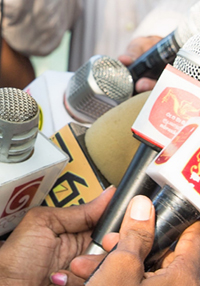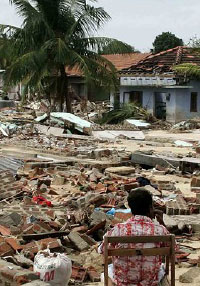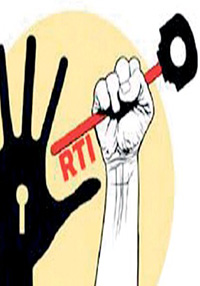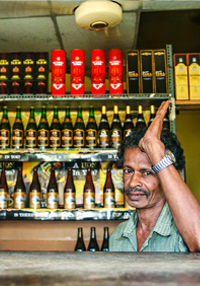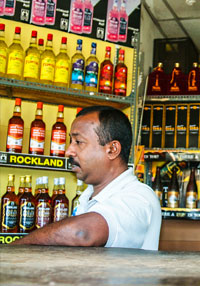The Election Commission of Sri Lanka is constitutionally empowered to regulate the media during an election period by issuing media guidelines.The present discourse on media regulation during elections focuses on how these guidelines have been used to regulate state-owned media. This briefing note examines how the Election Commission is also constitutionally empowered to regulate the privately-owned media during an election period.
இலங்கையின் அனர்த்த முகாமைத்துவ கட்டமைப்பில் காணப்படும் நிர்வாக இடைவெளிகள் தொடர்பாக வெரிட்டே ரிசர்ச் நடத்திய ஆய்வின் முடிவுகளை இந்த விளக்கவுரை ஆவணப்படுத்துகிறது. தகவல் அறியும் சட்டத்தை பயன்படுத்தி பெறப்பட்ட தகவல்களைக் கொண்டு இவ் ஆய்வு நடாத்தப்பட்டது.
වසර 2016 අගෝස්තු මස ශී්ර ලංකා පාර්ලිමෙන්තුව විසින් 2016 අංක 12 දරණ තොරතුරු දැනගැනීමේ අයිතිය පිළිබද පණත සම්මත කරන ලදී. පුරවැසියන්ට රාජ්ය තොරතුරු වෙත ප්රවේශ වීමට අවස්ථාව ලබාදීම හරහා ඔවුන්ව කි්රයාකාරී ජන ජීවිතයකට හුරු කිරීමත්, ඒ තුළින් රජය සහ රාජ්ය ආයතන තම එදිනෙදා කටයුතුවල දී වඩාත් විනිවිද භාවයෙන් සහ වගවීමෙන් කි්රයා කරන සංස්කෘතියක් නිර්මානය කිරීමත් පණත හඳුන්වාදීමේ අරමුණ විය.
This briefing note documents the findings of an investigation carried out by Verité Research on the administrative gaps within Sri Lanka’s disaster management framework. The investigation was conducted using the instrument of Right to Information (RTI).
The President issued a set of Emergency Regulations on 22 April 2019 in the aftermath of the Easter Sunday attacks in Sri Lanka. This briefing note explains the contents of the Emergency Regulations concerning the ‘control of publications’, and certain other regulations relevant to publication.
The Cabinet decision to withdraw Excise Notification No.02/2018 is unconstitutional. The Notification removes the ban on the sale of liquor to women within the premises of a tavern. This brief explains why the Cabinet decision constitutes an imminent infringement of the fundamental right to equal protection.
On 10 January 2018, the Minister of Finance and Mass Media amended Excise Notification No.666 of 31 December 1979. It is widely believed that by this act the Minister revoked a prohibition on the sale of liquor to women. The President and the cabinet responded by asking for the amendments to be reversed. This reversal is widely believed to have reinstated the previous prohibition on women purchasing liquor. Verité Research finds both these views to be poorly-informed.
The recent Court of Appeal judgement on SLFP MP Geetha Kumarasinghe’s disqualification from Parliament due to her dual citizenship has sparked a debate on whether the disqualification of candidates invalidates nomination papers. This briefing note discusses this issue and argues that nomination papers cannot be invalidated on the basis that a candidate is disqualified from being elected to parliament.
This brief, published by our legal team, analyses the limitations on the powers of the Executive President to assign subjects and functions to Ministers under the 19th Amendment (19A) to the Constitution. In particular, this paper argues that the Constitution and the 19th Amendment prohibit the President from assigning the subject of the Office on Missing Persons Act (OMP) to himself, and consequently from appointing the date on which the provisions of the OMP Act comes into operation.
The Framework Convention on Tobacco Control (FCTC) is the world’s first public health treaty and was adopted by the WHO in 2003 at the 56th World Health Assembly. Article 6 of the FCTC focuses on the use of tobacco taxation and pricing as an important measure for reducing the demand for tobacco.
